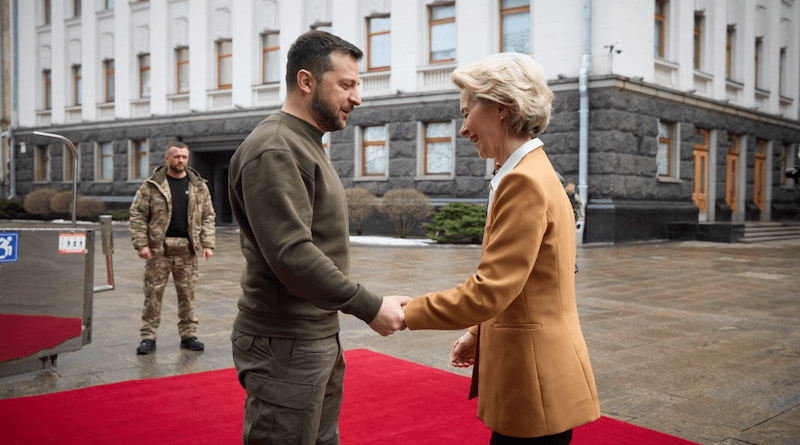EU Chief Von Der Leyen Expected To Travel To Ukraine For Europe Day
By EurActiv
By Alexandra Brzozowski
(EurActiv) — In another surprise visit, European Commission President Ursula von der Leyen is expected to travel to Ukraine for Europe Day, the EU’s executive announced on Monday (8 May).
“The visit will focus on all the dimensions of our relations with Ukraine,” EU chief spokesperson Eric Mamer told reporters, announcing the visit, during which Von der Leyen is expected to meet Ukraine’s President Volodymyr Zelenskyy in Kyiv.
The trip would have the purpose to reaffirm “the EU’s unwavering support towards the country”.
It will be the fifth visit of von der Leyen to the country since Russia’s war on Ukraine started in February 2022, with the most recent one having been the EU-Ukraine summit this year in early February.
“You will, of course have noticed as well this visit will take place on Europe Day,” Mamer said, referring to the annual celebration of European unity timed to mark the end of World War II on the continent.
It comes as Zelenskyy signed a decree making 9 May, Europe Day, while at the same time, he submitted a draft law to the Ukrainian parliament proposing that 8 May be the Day of Remembrance and Victory over Nazism in the Second World War.
Over the past few months, Ukraine’s leadership made an unequivocal plea for EU membership, with Ukrainian officials expecting accession talks could start as soon as the end of this year.
The Commission recommended EU candidate status for Ukraine in June 2022 on the understanding that Kyiv takes a series of legislative and policy steps.
The European Commission is set to publish its assessment of Ukraine’s progress later this year, with an oral presentation of the EU executive’s seven reform recommendations expected in the next weeks and the formal enlargement package in autumn.
The EU’s executive did not comment whether the oral assessment will be delivered to the Ukrainian side during the visit.

